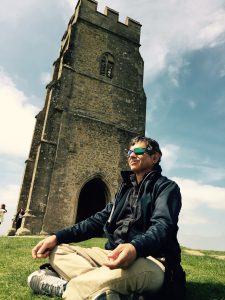Healing History
By Gary Reiss
“I know there are old demons which are coming back to the surface. They are ready to wreak chaos and death,” he said. “History sometimes threatens to take its sinister course once again.” French President Macron speaking at a ceremony honoring the breakout of peace of WWI, November 11, 2018.
Psychology
The central principle behind psychology focuses on individuals and their personal lives. It is about me or you and if we expand our lens, it is about our families also. This important central focus, however, covers about half of what psychology needs to cover. The missing half is not personal to me or you but what we carry psychologically due to our extended multi-generational family system, the groups we are part of, the history of these groups and the countries they come from. Working in both of these realms together gives us the potential for more inner development and freedom. Psychology has been built on the idea of personal change and taking responsibility for one’s life, with the exception of severe psychological problems which are seen as genetic or biochemical.
Peacemaking
The central principle behind most peacemaking and facilitation is to work with the problems of the present moment, to make some kind of peace treaty and write it up. We, those of us who are therapists, facilitators and peacemakers, don’t address the hidden presence history often plays. As a result, the various sides don’t understand that their conflict isn’t just their conflict, but history repeating itself. Many of us feel the way the Earth holds the trauma and ghosts of history. If these Earth-spots are not processed or cleared, history repeats itself again and again. Last year in Warsaw, a few weeks after I taught there, 60,000 white supremacists marched with slogans calling for a new holocaust. The lessons and the energy of the last holocaust have not been processed fully, so now here it comes again.
Processwork
Process-oriented Psychology has taken an approach that integrates the ghosts of history and says that we are neither just individuals suffering from our internal psychology, nor are we just groups of people or countries suffering from external present-centered problems. We are both. Often inner-work, psychological work, and spiritual development are split off from world change and social action. However, in Processwork we put this all together. From a Processwork standpoint, sustainable personal change doesn’t happen without changing the world, and sustainable world change doesn’t happen without the individual’s inner-work to change their feelings.
Processwork addresses individual issues, family issues and world issues as part of individual therapy. However, it also addresses social and world and historical issues through group work methods. The two main tools for this are open forums and group process. We call these methods the Worldwork part of Processwork, this unity of personal work, inner work, and outer world change.
Social Issues, Fields and Ghost Roles
Social issues that exist within the field affect individual psychology. We share a field; an atmosphere we can sense we are all part of. The field is full of roles being played by individuals, couples, families, organizations, businesses, or cities. In families, some common examples of roles might be the parent or the child, the healthy or the sick one, the good child, and the addict. There are also hidden roles, those felt and gossiped about but not represented or identified with. For example, in a hardworking family there may be a lazy uncle to always gossip about. This is a ghost role, something that exists in the family but is not identified with. When he is mentioned the energy of that uncle is present in the family even if the uncle isn’t physically present. Other common ghost roles are the addict, the killer, the child, the elder, or even abuse, death, and love.
History is a Ghost Role
One of the most impactful ghosts upon a family or group is history. I am Jewish. In many Jewish families, the Holocaust is never mentioned. Yet history is present always in the field. It is a ghost role but somehow still present. The issue for me is also personal. In my family, we knew part of our family had lots of people directly impacted by the Holocaust and the other side had almost no one.
As a child at the dinner table I once asked, “How come we have so many cousins and aunts on Mom’s side and almost no one on Dad’s side?” I think it was my mother who told me that my father’s side had “disappeared” in Europe. I learned in my late 50s that my family was from Poland and most of one side died in the camps, probably Auschwitz. I still have more to learn. These ghosts of our history permeated my family’s mood; they created an air of anxious negativity that seemed to not be about present life. The ghosts of history create this atmosphere. The first time I taught in Warsaw, before I knew I was from Poland, I could almost sense the ghosts. When someone goes to regions affected by World War II they can feel the ghosts still in the air. Many people have had this experience wandering the streets of Warsaw for example, as the participants told us at our seminars there.
Ghost Roles Need to be Processed
The ghosts left by unprocessed history are like uncooked energies in the field; they surface again and again and tend to recreate history. Our work as facilitators and therapists is to facilitate the cooking of personal and historical trauma so that we can work with these forces, these polarities, these sources of trauma, so that we don’t have to face them again in the same traumatic ways. We can instead learn from, integrate, process, detach from and transform our personal and historical trauma into being the next positive steps for ourselves and humanity.
by Gary Reiss, LCSW, PhD, Dipl.PW
Gary Reiss is a certified trainer in Process-oriented Psychology. Gary has a private practice in Eugene and Portland, Oregon, and teaches Process-oriented Psychology worldwide. His specialties include family therapy, sex therapy, working with coma patients, Worldwork in world hot-spots, organizational development, and integrating Processwork with different spiritual traditions. Gary is the director of the nonprofit organization The International Peace Group. He has published 11 books, including The Dance of Sex, Dreaming Money, Families that Dream Together, and Love, Power, and Wisdom. This post is an excerpt from his new book Healing History; Breaking the Cycle of Personal and Historical Trauma, published in 2018.


